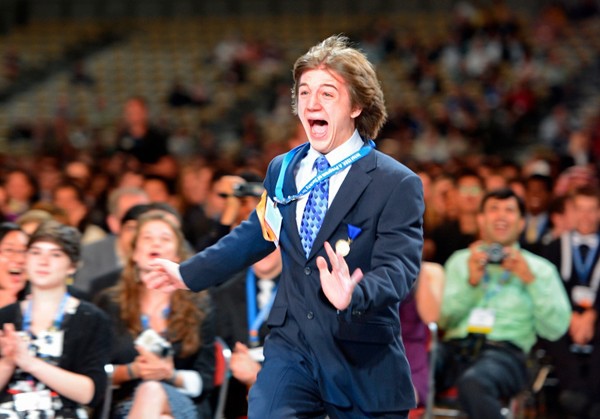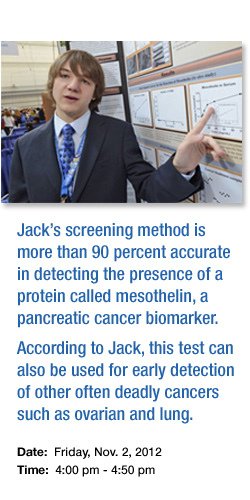




Maryland的North County高中神童Jack Thomas Andraka遇見伯樂病理學教授Anirban Maitra,發明早期胰臟癌血液或尿液偵測試紙,榮獲2012 Gordon Earle Moore Award(3)
Jack Thomas Andraka, was born in 1997, is an inventor, scientist and cancer researcher. He is the recipient of the 2012 Gordon Earle Moore Award, the grand prize of the Intel International Science and Engineering Fair. Andraka was awarded the $75,000 Award, named in honor of the co-founder of Intel Corporation, for his work in developing a new, rapid, and inexpensive method to detect an increase of a protein that indicates the presence of pancreatic, ovarian, and lung cancer during early stages when there is a higher likelihood of a cure.
In addition to the Gordon Earle Moore Award, Andraka also won other prizes in smaller individual categories for a total of $100,500 in prize money. Andraka won a fourth-place award in Chemistry at the 2013 Intel International Science and Engineering Fair with a project focusing on a novel Raman spectrometer with real world applications.
Hailing from Crownsville, Maryland, Jack Andraka has given a number of accounts of what inspired him to work on pancreatic cancer, including the death of a family friend whom he described as almost an uncle. These various narratives have been told by him as recently as his talk in TEDxNijmegen 2013. In looking for answers, he found that one reason for the poor survival rate from pancreatic cancer was the lack of early detection and a rapid, sensitive, inexpensive screening method. According to his account, his teenage optimism left him undeterred, and he went on to consult "a teenager's two best friends:Google and Wikipedia", also drawing upon content from YouTube. He began to think of various ways of detecting and preventing cancer growth and terminating the growth before the cancer cells become invasive.
In an interview with the BBC, Jack said the idea for his pancreatic cancer test came to him while he was in biology class at North County High School, drawing on the class lesson about antibodies and the article on analytical methods using carbon nanotubes he was surreptitiously reading in class at the time. Afterward, he followed up with more research using Google Search on nanotubes and cancer biochemistry, aided by free online scientific journals.
He then contacted 200 professors at Johns Hopkins University and the National Institutes of Health with a plan, a budget, and a timeline for his project in order to receive laboratory help. He received 199 rejection emails before he got a positive reply from Anirban Maitra, Professor of Pathology, Oncology, and Chemical and Biomolecular Engineering at Johns Hopkins School of Medicine.
The result of his project was a new dipstick type diagnostic test for pancreatic cancer using a novel paper sensor, similar to that of the diabetic test strip. This strip tests for the level of Mesothelin, a pancreatic cancer biomarker, in blood or urine, to determine whether or not a patient has early-stage pancreatic cancer. The test is over 90 percent accurate in detecting the presence of mesothelin. According to Andraka, it is also 168 times faster, 1/26,000 as expensive (costing around three cents), over 400 times more sensitive than the current diagnostic tests, and only takes five minutes to run. He says the test is also effective for detecting ovarian and lung cancer, due to the same mesothelin biomarker they have in common.
Professor Maitra is very enthusiastic about Andraka's future. He told the Baltimore Sun "You're going to read about him a lot in the years to come... What I tell my lab is, 'Think of Thomas Edison and the light bulb.' This kid is the Edison of our times. There are going to be a lot of light bulbs coming from him."
In October 2013, Andraka appeared as a guest on The Colbert Report. Andraka cultured MIA PaCa cells, from a commercial pancreatic carcinoma cell line, which overexpress mesothelin, a biomarker for pancreatic cancer. The mesothelin was isolated, concentrated and quantified with ELISA. After optimization with the Western Blot assay, the human mesothelin-specific antibodies were mixed with single-walled carbon nanotubes and used to coat strips of ordinary filter paper. This made the paper conductive. The optimal layering was determined using a scanning electron microscope. Cell media spiked with varying amounts of mesothelin were then tested against the paper biosensor and any change in the electrical potential of the sensor strip (due to the changing conductivity of the nanotubes) was measured, before and after each application. Specifically, what happened was this : The antibodies would bind to the mesothelin and enlarge. These beefed-up molecules would spread the nanotubes farther apart, changing the electrical properties of the network: The more mesothelin present, the more antibodies would bind and grow big, and the weaker the electrical signal would become.
A dose-response curve was constructed with an R2 value of .9992. Mr. Andraka claimed that his tests on human blood serum obtained from both healthy people and patients with chronic pancreatitis, pancreatic intraepithelial neoplasia (a precursor to pancreatic carcinoma), or pancreatic cancer showed a similar response. The sensor's limit of detection sensitivity was found to be 0.156 ng/mL; 10 ng/mL is considered the level of overexpression of mesothelin consistent with pancreatic cancer. Andraka's sensor costs $0.03 (compared to the $800 cost of a standard test) and 10 tests can be performed per strip, taking 5 minutes each. The method is 168 times faster, 1/26,667th as expensive, and 400 times more sensitive than ELISA, and 25% to 50% more accurate than the CA19-9 test.
Officials at Intel have said that Andraka's method is more than 90 percent accurate in detecting the presence of mesothelin. He has patented his method of sensing pancreatic cancer and is communicating with companies about developing an over-the-counter test.
Jack's father, Steve Andraka, is a civil engineer. His mother, Jane Andraka, is an anesthetist. She told the Sun "... we're not a super-athletic family. We don't go to much football or baseball." "Instead we have a million magazines sit around the table and talk about how people came up with their ideas and what we would do differently."



 留言列表
留言列表
